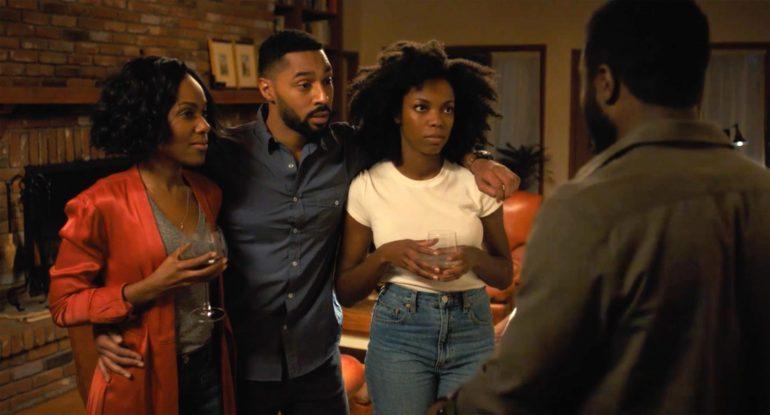Film Review: ‘The Weekend’
By Guy Lodge
LOS ANGELES (Variety.com) – , as stark white-on-black title cards usher in a muted, clarinet-led jazz score of faintly mournful whimsy. Check. It continues: Our protagonist is a dry, lovelorn standup comic, inclined to drop references to Godard and Fellini in casual conversation, working out romantic issues against a backdrop of warm autumnal melancholy. Check, check, check. Yet if Meghie’s easy, amiable film could be seen as a tribute of sorts to the embattled auteur, it also works to pointedly show up his (and many of his peers’) blind spots. It’s all set in California, for one thing, but more importantly, it’s centered entirely on a quartet of African-American millennials — a demographic rarely called upon to carry this kind of generously talky, relationship-focused indie.
“I constantly talk like I’m the supporting actress in a romantic comedy,” says Zadie (Sasheer Zamata), the aforementioned Los Angeles comedienne, in a line that feels loaded in several ways. In many a film, that’s exactly what she would be. There’s a slightly meta twinkle to the way spiky “Saturday Night Live” album Zamata — who indeed had a minor role in last year’s Amy Schumer vehicle “I Feel Pretty” — delivers the line: “The Weekend” is the first film to position her as a leading lady, and she takes to the promotion with winning, weary-wise conviction, lending the slender, pleasantly slouchy film around her a hint of determined backbone.
“The Weekend” is bookended with scenes of Zadie on stage at an intimate comedy club, as she spins her romantic misfortunes into easy laugh fodder. They have the slightly canned feeling of many onscreen depictions of standup, though perhaps that’s deliberate. Zadie’s humor appears to be sharper, tarter and more spontaneous in conversation, and the film suggests she’s not always at ease with either herself or her performance persona(e). Light allusions are made to past struggles with bipolar disorder, which also appears to have been a factor in the breakdown of her last serious relationship three years before. All these fine-grained human complications, deftly played by Zamata, bring welcome texture to an otherwise straightforward love-quadrangle setup.
Zadie and her ex Bradford (Tone Bell) have settled into a jovial just-friends relationship, though we need spend only a minute in their combined company to detect unhealed wounds and unresolved desires beneath their amicable banter. We meet them as they set out for an idle weekend away at the tranquil rural B&B run by Zadie’s fiercely judgmental mother Karen (Kym Whitley), joined by Bradford’s new girlfriend Margo (DeWanda Wise), a tightly wound princess type whose more traditional femininity and “Real Housewives” fandom make her an easy target of Zadie’s snarky scorn. If that sounds like a bad idea, so it is: Relations between the three are alternatively strained or outright hostile, further inflamed by the surprise arrival of another B&B guest: wholesome, newly single charmer Aubrey (Y’Lan Noel), whose immediate, reciprocated flirtation with Zadie sets Bradford further on edge.
There are no great surprises in the roundelay of confessions, betrayals and sweetly quickened heartbeats that ensues over an unhurried weekend of country strolls, wine-fueled meals and a consistent, humming stream of chatter. The offhand pleasures are all in the execution, from the softly bristling chemistry between the principals to the flame-colored glow of Kris Belchevski’s lensing, which understandably maximizes the earthy, crackly falltime textures of the film’s gorgeous locale. (The season is as moodily integral to this indoor-outdoor chamber piece as it was to Rohmer’s “Autumn Tale,” even if the effect is hardly as poetic.)
While this is principally Zamata’s showcase, neither she nor Zadie have things entirely their own way. Wise offers particularly fine, needling support, bringing passive-aggressive complexity to what could have been a condescending stock character, and splintering the film’s sympathies in the process. Meghie’s unobtrusive direction is attentive to such mellow subtleties in her script, which could have been played in a far higher key, though not to better effect. Notwithstanding any comparisons, there’s more assured personality here than there was in her last feature, the bright, proficient but somewhat synthetic big-studio teen romance “Everything, Everything.” Much of that film took place, by narrative necessity, in hermetically sealed rooms; here, the fresh autumn air agrees with everyone involved.

